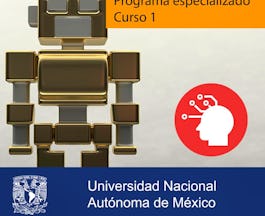Filter by
The language used throughout the course, in both instruction and assessments.
344 results for "human computer interaction"

University of Toronto
Skills you'll gain: Research and Design, Business Analysis, Business Psychology, Critical Thinking, Human Resources, Innovation, Leadership and Management, Organizational Development, People Analysis, Strategy and Operations, Change Management, Leadership Development

O.P. Jindal Global University
 Status: Free
Status: FreeUniversitat Autònoma de Barcelona

University of Maryland, College Park
Skills you'll gain: Entrepreneurship, Innovation, Marketing, Advertising, Business Process Management, Communication, Leadership and Management, Strategy, Strategy and Operations, Customer Success

Universidad Nacional Autónoma de México
Skills you'll gain: Adaptability, Artificial Neural Networks, Critical Thinking, Human Computer Interaction, Human Learning, Machine Learning, Machine Learning Algorithms, Machine Learning Software, Natural Language Processing, Theoretical Computer Science

Macquarie University
Skills you'll gain: Leadership and Management, Risk Management, Critical Thinking, Decision Making, Probability & Statistics, Employee Relations, Business Process Management, Finance, People Analysis, Statistical Tests

Johns Hopkins University

Tecnológico de Monterrey
Skills you'll gain: Agile Software Development, Collaboration, Organizational Development, Persona Research, Change Management, Culture, Scrum (Software Development), Adaptability, Business Process Management, Extract, Transform, Load

University of Illinois at Urbana-Champaign
Skills you'll gain: Business Design, Business Process Management, Leadership and Management, Strategy, Strategy and Operations, Business Analysis, Business Development, Operational Analysis, Business Intelligence, Mergers & Acquisitions

Parsons School of Design, The New School
Skills you'll gain: Leadership and Management, Creativity

University of Amsterdam
Skills you'll gain: Planning

Lund University
Skills you'll gain: Regulations and Compliance, Entrepreneurship, Mergers & Acquisitions, Strategy and Operations
In summary, here are 10 of our most popular human computer interaction courses
- Gender Analytics for Innovation: University of Toronto
- Ethics in Public Policy: O.P. Jindal Global University
- Sustainability of Social-Ecological Systems: the Nexus between Water, Energy and Food: Universitat Autònoma de Barcelona
- Innovation for Entrepreneurs: From Idea to Marketplace: University of Maryland, College Park
- Sesenta años de inteligencia artificial: Universidad Nacional Autónoma de México
- Risk governance: Manage the risks: Macquarie University
- PrEParing: PrEP for Providers and Patients: Johns Hopkins University
- Introducción a la gestión ágil de proyectos: Tecnológico de Monterrey
- Corporate Strategy: University of Illinois at Urbana-Champaign
- Creative Artifacts: Parsons School of Design, The New School










